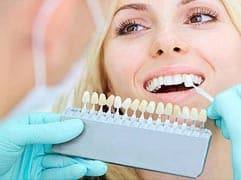Call (515) 277-6358 to schedule your consultation!
Fix Cavities
It is estimated that more than 90% of Americans have had a dental cavity. Your dentist can diagnose cavities through a routine dental examination, in which the dentist will use special dental instruments to look for areas of decay and will also ask about any sensitivity or pain in your teeth. Most dental examinations also include dental x-rays, which can help assess the extent and exact locations of cavities and tooth decay. Your dentist will determine which of three types of cavities you have: smooth surface, pit and fissure, or root. Based on the type of cavity and extent of decay, your dentist will then determine the most appropriate course of treatment for your cavity. Because tooth decay in its earliest stages is relatively easy to treat, the sooner your cavity is identified and treated, the better. If your cavity has already started to cause pain, you may need more extensive treatment, so be sure to schedule regular dental examinations even if you are not experiencing the symptoms of a cavity or other problems.
Cavities can be treated a few different ways, depending on their severity and your preferences. If your cavity is just beginning to form, your dentist may treat the tooth with a fluoride treatment, which can reverse a cavity if treated early enough. Fluoride helps restore the tooth’s enamel, and professional fluoride treatments contain high amounts of fluoride -- much more than is found in toothpaste, oral rinses, or tap water. Fluoride treatments may be brushed on to the teeth, or placed in a tray that fits over your teeth. Fillings, which dentists also call restorations, are the most common treatment option when a cavity has passed beyond its very early stages. Depending on the placement in your mouth and on your needs and preferences, fillings may be made of tooth-colored resin, porcelain, or an amalgam that includes metal. Once a cavity is beyond the point where a filling can help, your dentist may choose to treat your cavity with a crown. Crowns are also especially helpful when the teeth have been weakened by extensive decay or other causes, as the crown is a custom-fitted “cap” that is placed over the tooth and protects it from further damage or breakage. Your dentist will drill the decayed part of the tooth away and fit the crown over the healthy tooth portion that remains. Again depending on location in the mouth and patient preference, crowns may be made of porcelain, resin, metal, or porcelain fused to metal. Once decay has reached the pulp of the tooth, which is the soft tissue at the very center of a tooth, it may be time for a root canal. A root canal treats a tooth with severe damage or infection by removing the diseased pulp from the tooth’s center. If infection is present, the inside of the tooth may be treated with an antibiotic medication, and, once the tooth is treated, the dentist will replace the tooth’s pulp with a synthetic filling. As a very last resort, when teeth become so decayed that they cannot be restored, even with a root canal, they must be removed. Removing a tooth can cause gaps to form between the teeth, which can allow adjacent teeth to shift in the mouth; for this reason, and for aesthetic purposes, your dentist may recommend a bridge or permanent dental implant to replace any teeth that have been extracted.
To prepare for a dental appointment to assess your teeth for potential cavities, make a list of questions to ask your dentist. Questions may vary, from understanding the extent of your particular tooth decay, to asking about pain relief, printed informational materials, and after-care. If you aren’t clear on how to properly care for your teeth at home, to fend off any further decay, be sure to talk to your dentist about this and any other cavity-prevention strategies they may suggest. Your dentist will also have questions for you, which will include inquiries about any medications you are taking. Be sure to write down all prescription medications you take, as well as any vitamins, herbal remedies, supplements, and over-the-counter medications, and don’t forget to include the dosage. You’ll also need to inform your dentist of any allergies or adverse reactions you may have had to medications or local anesthetic. If you are experiencing pain or discomfort in your teeth before your appointment, you may find relief from over-the-counter pain medications or an over-the-counter topical anesthetic that’s designed to soothe dental pain. Some patients with tooth decay are bothered by extreme temperatures and may prefer to use warm water for brushing, along with a toothpaste that’s intended for sensitive teeth. Even if your teeth are sore or your gums are tender, be sure to thoroughly clean your entire mouth while you wait to get in for your dentist appointment, and take care to avoid extremely hot or cold food and drinks, as well as excessively sweet foods, which can aggravate decaying teeth. Once your cavity has been treated, be sure to maintain excellent oral hygiene, to prevent further cavities from forming and to protect the restored teeth from future problems.
More on Fixing Oral Health Care Problems : Fix Stained Teeth
Actual Patient Reviews
We have so many terrific reviews it's impossible for us to list them all! Thanks for supporting Iowa Dental Group with your gratitude.
Dental Office Location
Iowa Dental Group prides ourselves in offering the highest quality dentistry at a fair and reasonable fee.
Des Moines, Ia 50311
(515) 277-6358
iowadentalgroup@hotmail.com
https://www.iowadentalgroup.com
Iowa Dental Group Contact Form
Our Des Moines' Dentists Bob Margeas DDS & Nicholas Economos are eager to help provide any answers you may have. Contact us today regarding optimal oral health.
Dentist Office Hours
Our Dentists look forward to answering any dentistry related questions or dental concerns you may have regarding your overall oral health and smile.
Office Hours
| Monday: | 7:30am - 5:00pm |
| Tuesday: | 7:30am - 5:00pm |
| Wednesday: | 7:30am - 5:00pm |
| Thursday: | 7:30am - 5:00pm |
| Friday: | Closed |
| Saturday: | Closed |
| Sunday: | Closed |
















